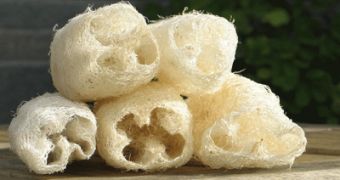A new research paper in the American Chemical Society's journal Environmental Science & Technology documents the use of loofahs to make microbial fuel cells that convert waste into electricity.
Loofahs are fairly popular these days, and not just because their name sounds funny enough to make people want to say it over and over again.
This fibrous matter, which comes from the ripened fruit of loofah plants, is used to make bathing sponges, chiefly because it does a great job exfoliating the skin.
According to specialist Shungui Zhou and his fellow researchers, delivering perfect skin is not the only thing loofahs can do. On the contrary, they can help solve the world's waste problem, and help generate eco-friendly energy.
In their paper, the researchers detail that, as several studies have shown, some bacteria have the ability to turn waste into electricity. These discoveries have led to the development of several types of so-called microbial fuel cells (MFCs).
The problem is that, for the time being, piecing together one such MFC is quite a downer financially-wise, not to mention the fact that the manufacturing process is not all that easy. Shungui Zhou and his colleagues maintain that, according to their research, loofahs might hold the key to dealing with both these issues.
As detailed on the official website for the American Chemical Society, the brainiacs have successfully used loofahs drenched in nitrogen-enriched carbon nanoparticles and bacteria to create MFCs that, when put to work, proved more efficient in converting waste into electrical power than previously developed MFCs have been documented to be.
The researchers say that this happened because loofahs have fairly large pores which allowed the bacteria to spread and thrive, thus upping the resulting MFCs energy generating capacity.
What's more, they argue that, since loofahs are not all that expensive and fairly easy to come by, the process of using them to make MFCs is far more sustainable than the other methods of using bacteria to produce electricity that have thus far been documented by science.
“Microbial fuel cells (MFCs) are a promising technology to recover electrical energy from different types of waste,” the researchers explain in their paper.
Furthermore, “This study introduces a promising method for the fabrication of high-performance anodes from low-cost, sustainable natural materials.”
The scientists plan to carry out further investigations, and determine whether or not it would be feasible to turn loofahs into MFCs on a commercial scale.

 14 DAY TRIAL //
14 DAY TRIAL //